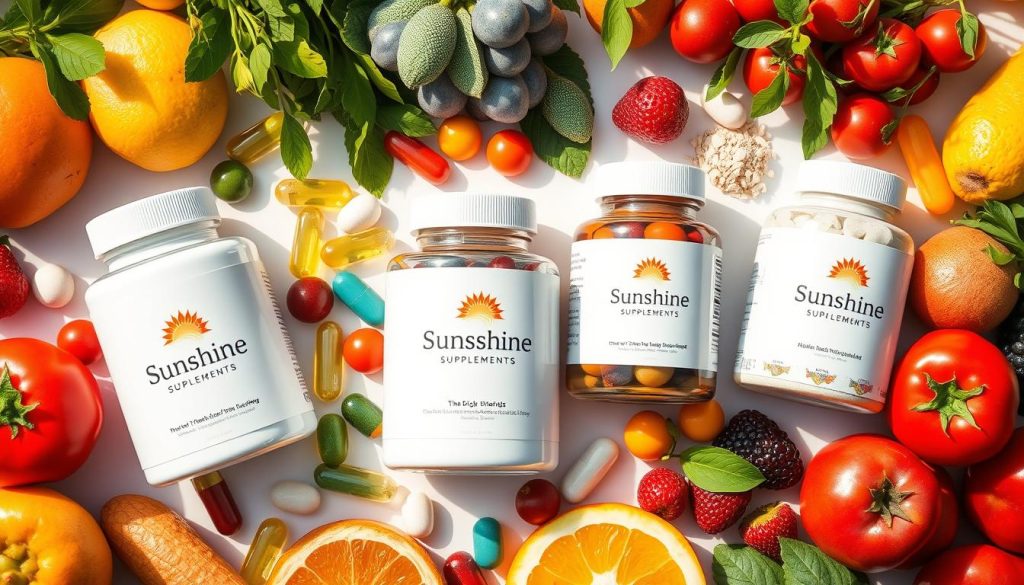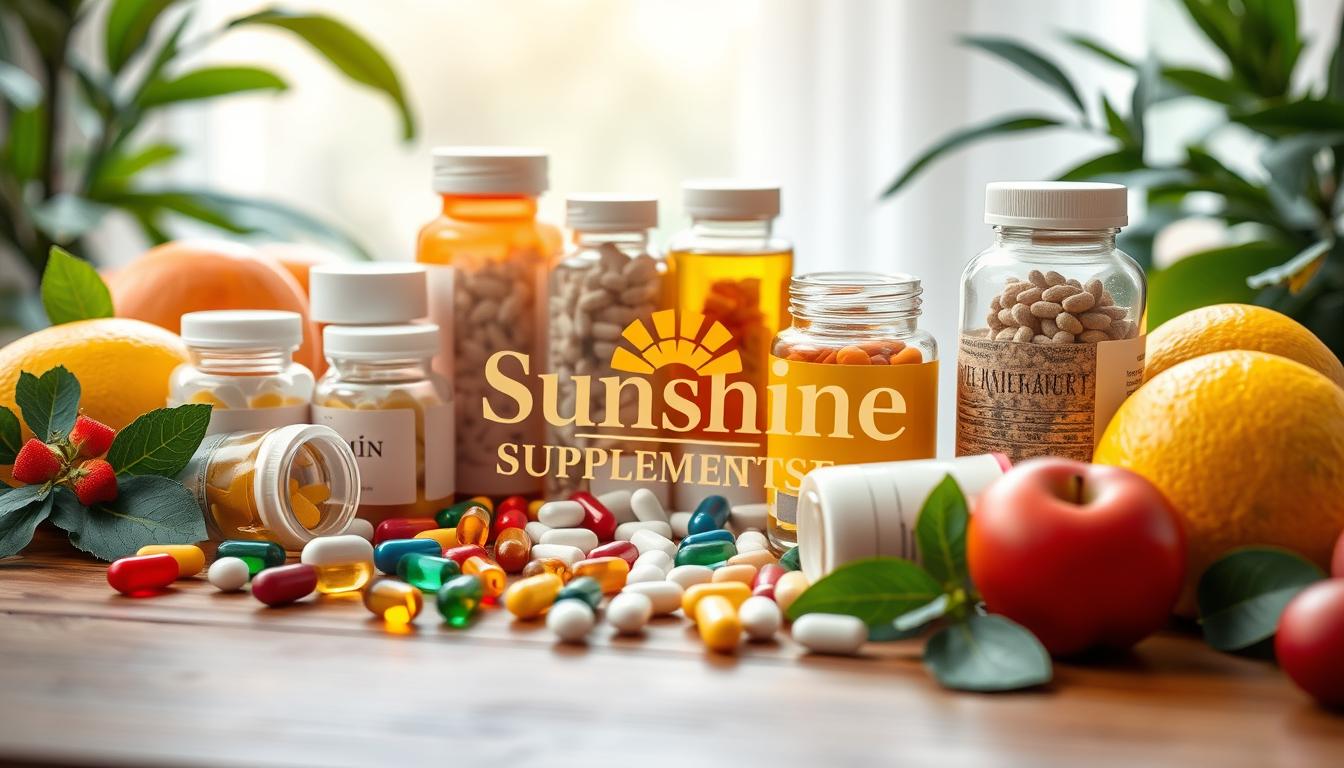About half of adults in the United States take vitamins or mineral supplements every day. These supplements help fill any gaps in your diet. They can give you an extra boost to your health and well-being.
Vitamin and mineral supplement use changes with age. The National Health and Nutrition Examination Survey found that 24.0% of adults aged 20-39 take supplements. This number goes up to 29.8% for those aged 40-59 and 39.4% for those 60 and over. Women are more likely to use these supplements, and this use increases with age compared to men.
Key Takeaways
- About half of U.S. adults take vitamin or mineral supplements daily
- Supplement usage rates vary by age, with higher rates among older adults
- Women are more likely to take multivitamin or multimineral supplements compared to men
- Supplements can help fill nutritional gaps when diet alone doesn’t meet recommended intakes
- A balanced, nutrient-rich diet should be the primary focus, with supplements as a supporting player
The Importance of Vitamins and Supplements
Keeping your nutritional needs in check is key for your wellness and health. Vitamins and minerals are essential for many body functions. They help with skin, muscle growth, nerve signals, and blood. Yet, our bodies can’t make enough of the 30 essential vitamins and minerals on their own, leading to nutritional gaps.
Understanding Nutritional Gaps
Not getting enough of certain nutrients can cause health problems. For example, not enough vitamin C can lead to scurvy. Vitamin A deficiency can cause blindness, and not enough vitamin D can cause rickets. Getting enough of these nutrients can help a lot, like keeping bones strong, preventing birth defects, and ensuring healthy teeth.
Why They Matter for Everyday Health
- Calcium, vitamin D, vitamin K, magnesium, and phosphorus work together to maintain strong bones.
- Folic acid supplements taken early in pregnancy can prevent brain and spinal birth defects.
- Minerals like fluoride contribute to healthy teeth and bone formation.
By focusing on nutritional needs with a balanced diet and natural remedies, you can reach your body’s full capacity. This supports your overall wellness.
Key Vitamins for Optimal Well-being
Eating a balanced diet is key for your health. Three important vitamins are Vitamin A, B Vitamins, and Vitamin C. Let’s look at why they’re so vital.
Vitamin A: The Vision Protector
Vitamin A is a strong antioxidant. It protects your eyes and keeps your vision sharp. It also helps your skin, lungs, heart, and kidneys stay healthy.
The daily Vitamin A intake is 900 mcg for men and 700 mcg for women. You can find it in carrots, sweet potatoes, spinach, and liver.
B Vitamins: Energy and Beyond
The B-complex vitamins are key for turning food into energy. They also help with cell growth, nervous system function, and making red blood cells. The right amount of B vitamins varies, but a good diet or organic supplements can help.
Vitamin C: Your Immunity Booster
Vitamin C boosts your immune system, helps wounds heal, and keeps your skin and tissues healthy. Adult men need 90 mg of Vitamin C daily, and women need 75 mg. Smokers should add 35 mg more.
Citrus fruits, bell peppers, and leafy greens are great sources of Vitamin C.
Adding these vitamins to your diet, with vitamin deficiency-fighting foods or organic supplements, boosts your well-being. It supports your body’s essential functions.

Essential Minerals to Include in Your Diet
Keeping a healthy diet is key to meeting your body’s needs, including minerals. Calcium, magnesium, and iron are three minerals that greatly impact your health.
Calcium: Building Strong Bones
Calcium is vital for strong bones and teeth. It also helps muscles and nerves work right. You need 1,000 to 1,200 milligrams of calcium daily, based on age and gender. Dairy, leafy greens, and fortified foods are great sources.
Magnesium: The Relaxation Mineral
Magnesium helps with many body functions, like blood pressure and nerve function. Many in the U.S. don’t get enough magnesium. Whole grains, nuts, seeds, and leafy greens are full of it.
Iron: Combatting Fatigue
Iron is key for oxygen transport and immune health. It helps fight fatigue. The daily iron need is 8 to 18 milligrams, based on age and gender. Red meat, poultry, seafood, and fortified cereals are good sources.
Adding these minerals to your dietary supplements and diet helps with bone health, energy, and body function. Talk to a healthcare expert to find out your mineral needs. They can help you plan a balanced diet and supplements if needed.
The Role of Antioxidants in Health
Antioxidants are natural compounds that help keep you healthy. They fight off free radicals, which are harmful molecules. These molecules can damage cells and lead to chronic diseases.
What Are Antioxidants?
Antioxidants are chemicals found in nature. They protect against free radicals, which are harmful molecules. Free radicals can damage cells and increase the risk of chronic diseases.
Key Sources of Antioxidants
Plant-based foods are the best sources of antioxidants. This includes fruits, vegetables, whole grains, nuts, seeds, herbs, and spices. Here are some examples:
- Vitamin C: Broccoli, Brussels sprouts, sweet potatoes, bell peppers, tomatoes, and citrus fruits.
- Vitamin E: Almonds, avocado, sunflower seeds, oatmeal, and legumes.
- Beta-carotene: Apricots, cantaloupe, mangos, carrots, grapefruit, and bell peppers.
- Selenium: Eggs, tuna, salmon, brown rice, onions, and various vegetables.
Eating a variety of colorful fruits and vegetables is key. It ensures you get a range of antioxidants and nutrients.
How They Support Your Body
Antioxidants are vital for preventing cell damage and maintaining health. They neutralize free radicals, reducing the risk of diseases like heart disease, cancer, and Alzheimer’s. Eating antioxidant-rich natural remedies and herbal supplements boosts your body’s defense.

“Antioxidants are certain nutrients like vitamins C or E, or carotenoids, that help protect cells against daily damage caused by free radicals.”
Supplements for Specific Health Needs
Supplements are key in health and wellness, helping with specific issues and overall well-being. Omega-3 fatty acids and probiotics are two important ones to think about.
Omega-3 Fatty Acids: Heart and Brain Health
Omega-3 fatty acids are great for heart and brain health. They are found in fish oil and some fish. These nutrients help keep cholesterol levels healthy, reduce inflammation, and boost brain function.
Research shows that omega-3 supplements can slightly lower cancer risk in older men. This is after taking them for 11 years.
Probiotics: Aiding Gut Health
Probiotics are good bacteria in your gut. They support digestion, boost immunity, and affect mood and brain function. Adding probiotic foods or supplements to your routine is beneficial for health.
Remember, different health issues need different supplements. Always talk to a healthcare provider before starting any new supplements. They can guide you on the best products and amounts for your needs.
“Specialty supplements are designed for specific health needs, such as joint health, sleep support, and beauty, catering to targeted nutrition, not broad-spectrum multivitamins.”
Looking to support your heart, brain, or gut? Supplements can make a big difference in your health. Work with your healthcare provider to find the right supplements for your health products and wellness goals.
Choosing the Right Supplements
Choosing the right dietary supplements is key for your health. With so many options, it can feel overwhelming. But, by focusing on a few important factors and understanding labels, you can find the best supplements for you.
Factors to Consider
Your age, gender, diet, and health conditions matter when picking supplements. Look for products that fill your nutritional gaps. Supplements can help with everything from immune health to bone strength.
Reading Supplement Labels
It’s vital to read labels carefully. Look for third-party tested supplements for quality. The Dietary Supplement Health and Education Act of 1994 doesn’t require the same testing as drugs. This means manufacturers are mostly responsible for safety and effectiveness.
When you read labels, check the active ingredients and serving sizes. Also, watch out for allergens or drug interactions. Remember, the FDA doesn’t regulate supplements like it does prescription drugs.
| Supplement Quality Certifications | What They Ensure |
|---|---|
| ConsumerLab | Purity, potency, and safety |
| US Pharmacopeia (USP) | Purity, potency, and dissolution |
| NSF International | Purity, potency, and contaminant testing |
By considering your needs and reading labels well, you can choose the right supplements. This supports your health and wellness.

How to Safely Incorporate Supplements
Adding vitamin and mineral supplements to your daily routine is important. It’s key to follow the right dosage and timing. This ensures you get the most benefits without risks.
Dosage Guidelines
It’s vital to stick to the recommended amounts on supplement labels. Taking too much, like fat-soluble vitamins, can be harmful. Here are some tips:
- Too much vitamin A can cause birth defects.
- High doses of vitamin A and beta-carotene may increase lung cancer risk in smokers.
- Prenatal vitamins with extra folic acid and iron are good for a healthy baby.
- More than 1,000 mg of vitamin E daily can increase bleeding risk.
Timing Your Supplements
The time you take your supplements matters. Some work better with food, others on an empty stomach. Here’s a general guide:
- Fat-soluble vitamins (A, D, E, K) work best with a meal that has healthy fats.
- Water-soluble vitamins (B vitamins, vitamin C) can be taken anytime.
- Don’t take calcium, zinc, and magnesium together because they compete for absorption.
By following these tips and considering when to take your supplements, you can maximize their benefits. This is true for both vitamin deficiency and organic supplements.
“Supplements can be a valuable addition to a healthy diet, but it’s vital to use them responsibly and under a healthcare professional’s guidance.”
Common Myths About Vitamins and Supplements
It’s key to know the truth about vitamins and supplements. Many myths can confuse and even harm us. Let’s explore some of these myths and find out what’s real.
Debunking Misconceptions
Many think more vitamins and supplements are always better. But, too much of some nutrients can harm us. For example, too much vitamin B6 can damage nerves, and too much vitamin D can cause high calcium levels in the blood.
Some believe natural supplements are always safe. While many plant-based supplements are good for us, “natural” doesn’t mean “safe.” Some herbal supplements can interact with medicines or cause side effects, even in large amounts.
The Truth About Overdosing
Too much of vitamins and minerals can be dangerous. Taking too much magnesium can cause paralysis or even death. Too much vitamin C can lead to kidney issues and vitamin B12 deficiency. Always follow the recommended doses and talk to a doctor before starting new supplements.
The supplement industry isn’t well regulated. Many products don’t list their ingredients correctly. It’s vital to choose high-quality, tested supplements from trusted brands. This ensures you get what you pay for and avoid harmful contaminants.
Vitamins and supplements aren’t a magic solution for health. They can help, but only when used with a nutritious diet and a healthy lifestyle. By knowing the facts and getting advice from doctors, you can make smart choices for your wellness.
The Benefits of a Whole Food Approach
Eating whole foods is better than just taking supplements. Whole foods give you nutrients in their natural state. This means your body can absorb them better and get extra health benefits.
Food Sources of Key Nutrients
Eating a variety of whole foods is key. This way, you get all the vitamins, minerals, and phytonutrients your body needs. Here are some top sources:
- Fruits and vegetables: Full of antioxidants, fiber, and vitamins
- Whole grains: Good for complex carbs, fiber, and B vitamins
- Lean proteins: Like fish, poultry, and legumes, for amino acids
- Healthy fats: In nuts, seeds, and avocados, for heart and brain health
Cooking Tips for Nutrient Preservation
To keep nutrients in whole foods, use the right cooking methods. Here are some tips:
- Choose gentle cooking like steaming, sautéing, or quick boiling
- Don’t overcook veggies to keep vitamins and minerals intact
- Add raw fruits and veggies to your meals when you can
- Keep fresh produce in good condition to keep nutrients
By choosing whole foods and using these cooking tips, you can get the most health benefits. This way, you support your overall health and well-being.
“A diet rich in a variety of whole, plant-based foods can provide a wealth of essential nutrients, fiber, and beneficial plant compounds that work together to promote optimal health.”
The Role of Lifestyle Choices in Nutrition
Your health is greatly affected by your lifestyle, mainly your diet. Supplements can help, but they work best when you eat healthy foods too. By combining exercise, managing stress, and eating right, you can improve your health and maybe need fewer supplements.
Exercise and Nutrition Synergy
Exercise boosts your need for nutrients and helps your body absorb them better. Good nutrition is key for exercising well and recovering fast. Eat a variety of whole foods like lean proteins, carbs, fats, and fruits and veggies. This keeps your energy up, helps muscles, and boosts your health.
Stress Management and Its Impact on Health
Too much stress can hurt your health by using up important nutrients. Using stress-reducing activities like mindfulness or meditation helps keep your nutrient levels balanced. This might cut down on the need for supplements and improve your health.
For better health, focus on a balanced diet, regular exercise, and managing stress. This approach can help you need fewer health products. By choosing wisely, you can take charge of your wellness journey.
“Proper nutrition, combined with regular exercise and stress management, can be a transformative approach to achieving and maintaining optimal health.”
| Nutrient | Importance | Food Sources |
|---|---|---|
| Potassium | Helps lower blood pressure, reducing heart disease and stroke risk. | Bananas, sweet potatoes, leafy greens, beans, nuts, and avocados. |
| Calcium and Vitamin D | Keep bones strong, preventing osteoporosis which increases with age. | Dairy products, leafy greens, fortified foods, and fatty fish. |
| Dietary Fiber | Reduces constipation, lowers cholesterol levels, and regulates blood sugar levels. | Whole grains, fruits, vegetables, nuts, and legumes. |
| Vitamin B12 | Supports cognitive function. | Meat, poultry, fish, eggs, and dairy products. |
Consulting Healthcare Professionals
It’s key to talk to healthcare experts before starting new supplements or health products. They can guide you on the best supplements for your needs. This helps you choose from the many options out there.
When to Seek Advice
You should talk to a healthcare professional if you:
- Have existing health conditions or take medications
- Experience symptoms of nutrient deficiency
- Have concerns about your diet and overall nutritional intake
- Want to optimize your health and wellness through targeted supplementation
Finding a Qualified Practitioner
When looking for advice on supplements and health products, find experts in nutrition and integrative medicine. Look for registered dietitians, naturopathic doctors, or physicians who specialize in functional or integrative healthcare. Be wary of those who make exaggerated claims or push extreme supplement plans.

The dietary supplement industry in the U.S. isn’t as tightly regulated as pharmaceuticals. This means safety, effectiveness, and quality can vary a lot. A qualified healthcare professional can guide you through this and help you choose the right health products.
Making Informed Choices for Your Health
In the world of vitamins and supplements, finding the right balance is key. Your nutritional needs can change over time. So, it’s important to regularly check if you’re getting what you need.
As you explore the nutrition market, keeping up with new research is vital. This helps you make smart choices for your health.
Balancing Diet and Supplements
Supplements can fill nutritional gaps, but they shouldn’t replace a healthy diet. Try to get most of your nutrients from whole foods. Use supplements to help fill any gaps.
Remember, too much of some vitamins can be harmful. Always talk to your doctor before starting any supplements. They can help you find the right amount for you.
Staying Informed on Latest Research
The world of vitamins and supplements is always changing. New studies and findings come out all the time. Keeping up with this research is important for your health.
Be cautious of exaggerated health claims. Instead, trust reliable sources and talk to your doctor. This way, you can make choices that support your overall health and wellness.




